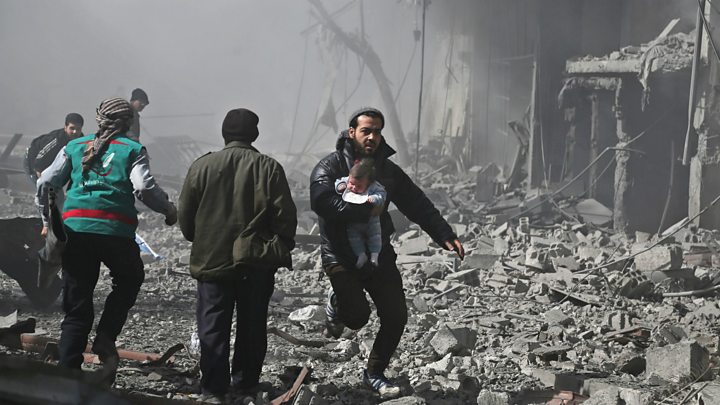A doctor working in the Syrian rebel enclave of the Eastern Ghouta says the situation is “catastrophic” – and he believes the international community has abandoned the people living there.
“We don’t have anything – no food, no medicine, no shelter,” Dr Bassam told the BBC. “We don’t have bread. We don’t have anything.”
“Maybe every minute we have 10 or 20 air strikes,” Dr Bassam said.
Three days of bombing in the area reportedly killed at least 250 people.
The Syrian military says it is trying to liberate the area from terrorists – but it has also been accused of targeting civilians.
“They targeted everything: shops, markets, hospitals, schools, mosques, everything,” Dr Bassam said. “I will treat someone – and after a day or two they come again, injured again.”
“Where is the international community, where is (the UN) Security Council… they abandoned us. They leave us to be killed,” he said.
What’s happening in the Eastern Ghouta?
Pro-government forces – backed by Russia – intensified their efforts to retake the last major rebel stronghold on Sunday night.
More than 50 children were among the dead, according to activists. About 1,200 people were injured.
The UN has called for a ceasefire to allow humanitarian aid to be delivered and the wounded to be evacuated.
The Eastern Ghouta is dominated by the Islamist faction Jaysh al-Islam. But Hayat Tahrir al-Sham, a jihadist alliance led by al-Qaeda’s former affiliate in Syria, also has a presence there.
Syrian state television reported that at least six people living in government-controlled areas of eastern Damascus were killed earlier this week – and 28 others wounded – by shells fired from the Eastern Ghouta.
The Syrian military said it carried out “precision strikes” on areas from which the shells were launched.
New players are shifting the war
By Jeremy Bowen, BBC Middle East editor
After seven years, Syria’s war is not ending but it is changing.
President Assad now looks like he is trying to roll up this final major enclave around Damascus – the Eastern Ghouta. This would secure his victory around the capital, and would be a very big moment.
But Syria remains linked into a web of war and power politics, which guarantees more conflict.
Up in the north, there are a whole host of big powers completing for influence: Russia, Iran, Turkey and the United States. British Special Forces are there, too.
Iran is seen as a particularly big threat by the Americans, the Israelis, who are also getting involved increasingly, and the Saudis, who have been big players in the war as well.
While the cast of characters is changing, the bloodshed continues and it is certainly not over.
How bad is the situation in the enclave?
The violence in the region – designated as a “de-escalation zone” by Syria’s main allies, Russia and Iran, as well as Turkey – is the worst since 2013, when a chemical attack killed hundreds of people, activists say.
They say at least 10 towns and villages across the Eastern Ghouta came under renewed bombardment on Tuesday.
“People have nowhere to turn,” a local doctor told the Union of Medical Care and Relief Organisations, which supports medical facilities in the Eastern Ghouta
“They are trying to survive but their hunger from the siege has weakened them significantly.”
Mr Moumtzis said at least six hospitals had been hit in the area on Monday and Tuesday, and warned that such attacks might amount to war crimes.

The government has allowed one humanitarian convoy into the Eastern Ghouta since late November, and there are severe shortages of food.
A bundle of bread now costs close to 22 times the national average and 12% of children under five years old are said to be acutely malnourished.
What else is going on in Syria?
Meanwhile, pro-government fighters have been sent to the Kurdish enclave of Afrin in northern Syria to confront an offensive by Turkish troops and Syrian rebels.
Turkey fired shells near the advancing columns, which, it says, forced the pro-government fighters into retreat.
Afrin lies just south of the Turkish border. Turkey is trying to oust the Kurdish YPG militia, which controls the area and which has called on the Syrian military for help.
Syria has denounced the Turkish offensive as a “blatant attack” on its sovereignty, while Turkey has insisted it will not back down.
Syrian government forces are also carrying out offensives on the rebel-held north-western province of Idlib. The UN says more than 300,000 people have been displaced by the fighting there since December.
Source www.bbc.com


Be the first to comment at "Syria war: Eastern Ghouta bombing ‘catastrophic’"